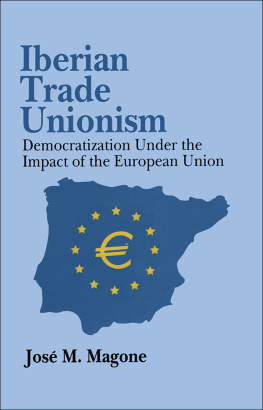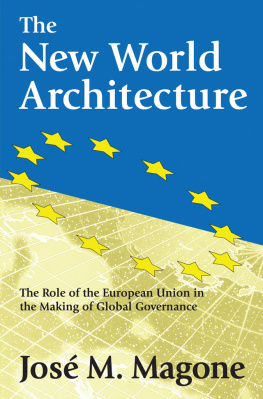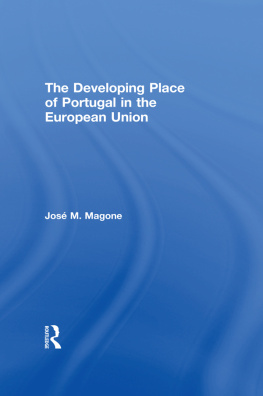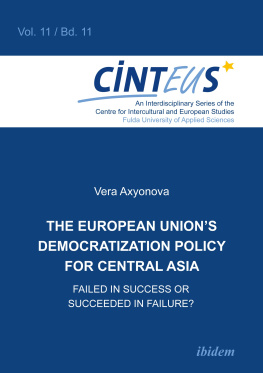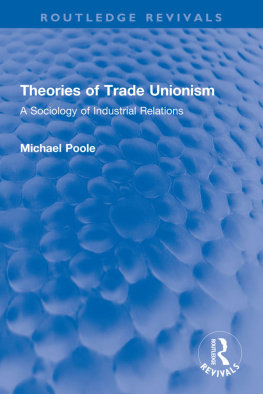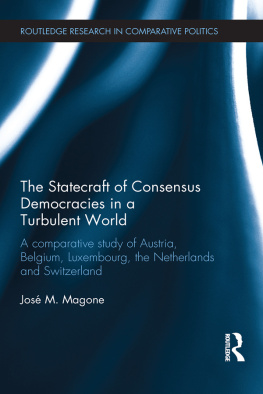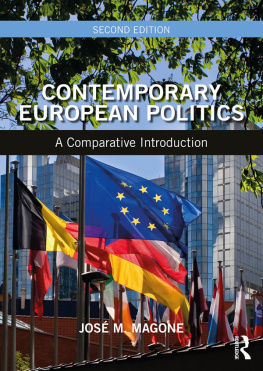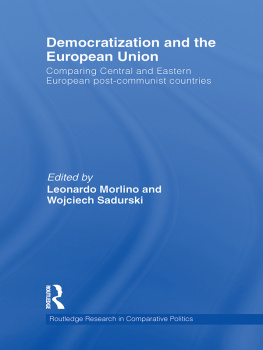First published 2001 by Transaction Publishers
Published 2017 by Routledge
2 Park Square, Milton Park, Abingdon, Oxon 0X14 4RN
711 Third Avenue, New York, NY 10017
Routledge is an imprint of the Taylor and Francis Group, an informa business
Copyright 2001 by Taylor & Francis.
All rights reserved. No part of this book may be reprinted or reproduced or utilised in any form or by any electronic, mechanical, or other means, now known or hereafter invented, including photocopying and recording, or in any information storage or retrieval system, without permission in writing from the publishers.
Notice:
Product or corporate names may be trademarks or registered trademarks, and are used only for identification and explanation without intent to infringe.
Library of Congress Catalog Number: 2001027044
Library of Congress Cataloging-in-Publication Data
Magone, Jos M. (Jos Maria), 1962-
Iberian trade unionism : democratization under the impact of the European Union / Jos M. Magone.
p.cm
Includes bibliographical references and index.
ISBN 0-7658-0077-2 (cloth : alk. Paper)
1. Labor unionsPortugal. 2. Labor unionsSpain. I. Title.
HD8596.5 .M34 2001
331.880946dc21
2001027044
ISBN 13: 978-0-7658-0077-0 (hbk)
Dedicated to
my dear sister Teresa
Oh libertad preciosa
no comparada al oro,
ni al bien mayor de la espaciosa tierra,
ms rica y ms gozosa
que el precioso tesoro
que el mar del sur entre su ncar cierra...
Lope de Vega (1562-1635)
CCOO Comisiones Obreras/Workers Commissions (E)
CEEP Centre Europen des Enterprises Participation Publique/European Centre of Enterprises with Public Participation
CES(P) Conselho Economico e Social/Economic and Social Council
CES(E) Consejo Economico y Social/ Economic and Social Council
CGTP-In Confederaco Geral dos Trabalhadores Portugueses-Intersindical/ General Confederation of Portuguese Workers-Intersindical
CiU Convergencia i Uni/Convergence and Union
CPCS Conselho Permanente de Concertaco Social/Permanent Council for Social Concertation
EMU Economic and Monetary Union
ESC Economic and Social Committee of the European Union
ETUC European Trade Union Confederation
GATT General Agreement on Tariffs and Trade IMF: International Monetary Fund
ITUC Interregional Trade Union Confederation
IU Izquierda Unida/United Left
PS Partido Socialista/Portuguese Socialist party
PCP Partido Comunista Portugus/Portuguese Communist party
PSD Partido Socialdemocrata/Social Democratic party
PSOE Partido Socialista Obrero Espaol/Spanish Socialist Workers party
SEM Single European Market
TEU Treaty of the European Union(Maastricht Treaty)
UGT(P) Unio Geral dos Trabalhadores(P)/ General Union of Workers
UGT(E) Unin General de los Trabajadores(E)/General Union of Workers
UNICE Union des Confederations de Industrie et des Employeurs dEurope/Union of European Confederations of Industry and of Employers
WTO World Trade Organization
One of the most neglected areas of the European integration process is the role that trade union confederations may play in the long run after the full establishment of the Economic and Monetary Union. The gradual establishment of the four freedoms enshrined in the Single European Act would require a transformation of the present strategies of trade union confederations toward more flexibility and toward the ability to take part in different levels of the European integration process. This book intends to make a contribution to fill the gap left by previous researchers on the European Union. The book is divided into three main parts.
The first part addresses the contexts in which the Iberian trade union confederations are operating. Both the making of global governance and the emergence of regional trading blocks will be analyzed carefully, so that one can be aware of the structure of opportunities and constraints that interest groups have to face today. A general assessment is then drawn in Chaps. 3 and 4 on the agenda within the European Union that trade union confederations may pursue and the strategies the different trade union confederations of member states have developed to pursue this common agenda. On the whole, the first part contextualizes both the Portuguese and Spanish trade union experiences, which became gradually more integrated into the decisionmaking networks of the supranational interest group European Trade Union Confederation (ETUC) as well as the institutions of the European Union.
The second part of the book analyses the transformation of the national systems of intermediation in the 1990s. The decline of steering power of Spanish and Portuguese political systems vis--vis global and European political and economic processes had its effects on the national systems of intermediation. National systems of interest intermediation became more and more intertwined and constrained by supranational European public policies. The convergence criteria set up in the Treaty on the European Unionthe stability pacts at the national level-designed at supranational levelwere major factors in transforming national systems of interest intermediation from a rigid to a more flexible approach.
This had consequences for Spanish and Portuguese trade union confederations. Representation of the working force had to be expanded from the national to other arenas (subnational as well as supranational, and sometimes transnational). This shift of strategies is the main topic of the second part. The main problems (institutional and/or economic, performance) of trade union confederations in this transition from national trade unionism to multilevel trade unionism is analyzed in depth for Spain and Portugal. In doing so, the structures of opportunities and constraints defined in the first part are mentioned and tested to understand the dilemmas of Iberian trade unionism on the verge of the millennium.
The third part deals with subnational and supranational policies and strategies of Iberian trade union confederations. concentrates on the growing transborder cooperation between Spanish and Portuguese trade union confederations. The work is based on original research done along the border between Spain and Portugal. The different cooperation projects of the Iberian trade union confederations are discussed within a European integration context.
The last chapter deals with the integration of Iberian trade union confederations in the institutions of the European Union as well as the ETUC. This is also based on original research done in Madrid, Lisbon, and Brussels.
The book concludes by making some conclusions on the redesigning of European trade unionism in general, and Iberian trade unionism in particular, within the new structures of opportunities and constraints imposed by global and European Union governance.
It took me four years to complete this book. I wish to take the opportunity to thank several institutions and persons for supporting this project. First of all, I wish to thank the University of Hull for the study leave in the winter semester of 1997/98, during which I was a visiting researcher in the prestigious Centre for Advanced Studies in Social Sciences in the Juan March Institute in Madrid. I particularly wish to thank Jos Ramon Montero, Jos Maria Maravall, Martha Peach, and the Juan Marchistas for their support and friendliness during my stay at the Institute. I wish to thank Concha Jimnez Lpez, Nati Torreju de Diego, Isabel Gomez Galvez, and Olga Ruiz de Leon Onrubia from the Documentation Centre of Comisiones Obreras for helping out with my inquiries and for giving me permission to use the excellent newspaper archive. I was able also to travel to Santiago de Compostela, Valladolid, Mrida, Sevilla, Lisbon, Oporto, and Elvas during October and November 1997. I wish to thank Jsus Rodriguez Salvanes of the Fundacin Largo Caballero for providing with internal documentation of the Spanish UGT during my stay in Madrid in July 1996.

